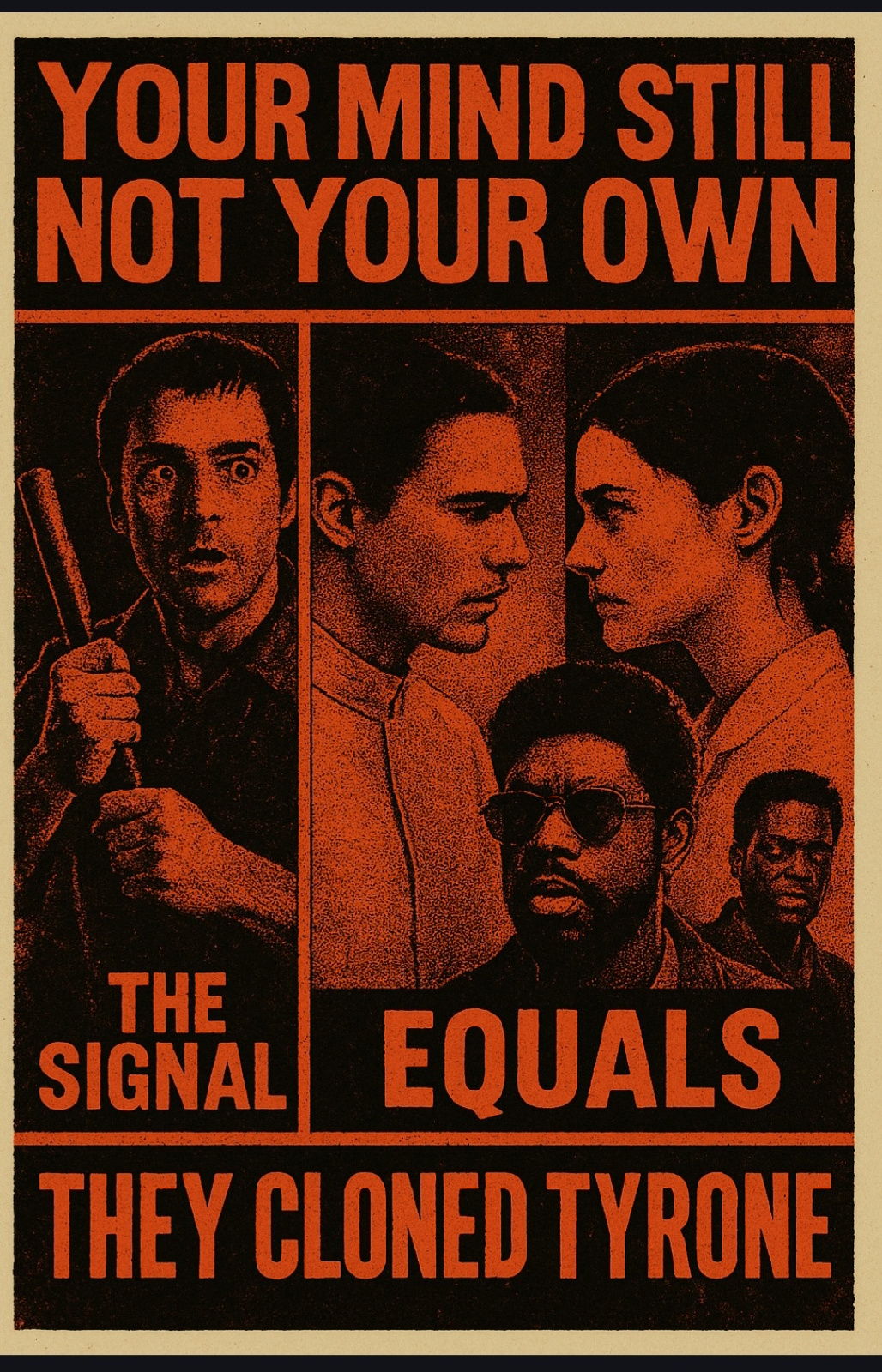(The Disrupted Identity Trilogy)
🔊 1. The Signal (2007, David Bruckner, Dan Bush, Jacob Gentry)
“Do you have the crazy?”
An experimental horror told in three segments by three directors, The Signal is about a mysterious broadcast that hijacks all electronic communication and warps the minds of its listeners into paranoid, violent delusion. But unlike traditional zombie narratives, the infected here remain aware. They believe what they’re doing makes sense.
🌀 Control Vector: Information as viral psychosis 🧬 Form: Media transmission + perceptual rupture 🧠 Core Dread: You’re not being manipulated—you’re interpreting reality wrong.
Key takeaway: Control has become decentralized. No clear villain, just a poisoned frequency. Mass psychosis as crowdsourced apocalypse.
💊 2. Equals (2015, Drake Doremus)
“Emotion is the disease. Love is the rebellion.”
In a post-post-apocalypse society, humans have been genetically reprogrammed to eliminate emotion. Everyone lives in grayscale minimalism. But when two people fall in love, they are diagnosed with “Switched-On Syndrome” and are treated as if mentally ill. Emotion is criminalized—yet secretly craved.
🌀 Control Vector: Genetic design + social anesthesia 🧬 Form: Emotional nullification masquerading as peace 🧠 Core Dread: What if the cure is the disease?
Key takeaway: This is THX 1138 re-emerging through the lens of post-Tumblr affective disconnection. Even love is commodified, pathologized, contained.
🧬 3. They Cloned Tyrone (2023, Juel Taylor)
“They messing with our minds. Our chicken. Our music. Our language.”
Set in a surreal, neon-drenched version of a Black neighborhood, this conspiracy-satire-comedy reveals a massive government experiment: cloning, drugging, and behavioral conditioning of an entire population—covertly maintained through beauty shops, churches, and fried chicken joints. Think Blaxploitation meets The Truman Show in an MKUltra funhouse.
🌀 Control Vector: Cultural manipulation via institutional infiltration 🧬 Form: Clone tech + chemical sedation + erasure of identity 🧠 Core Dread: You don’t even own your rebellion.
Key takeaway: The systems aren’t just controlling you—they're controlling your narrative, your taste, your resistance. Subversion has been franchised.
🎬 Combined Dissection: From Interference to Infiltration
Film
Method of Control
Visual Tone
Core Theme
The Signal
Broadcast hallucination
Analog chaos
Perception is a virus
Equals
Emotion repression via gene design
Cold minimalism
Feelings as deviance
They Cloned Tyrone
Cultural control + cloning
Hyperstylized urban pulp
Weaponized identity
📡 The Evolution of Mind Control:
Old Control: Laws, uniforms, pills
New Control: Aesthetic algorithms, emotions as error codes, culture as camouflage
“You don’t need a cage if the music plays just right.” “You don’t need a warden if you call it a vibe.”
Your mind is still not your own: BONUS ROUND – Maniac (Netflix, 2018)
Welcome to the neural backroom of the binge stream. You’ve made it this far, so let’s jack into C-Pill territory—where memory isn't therapy, it’s theater, and you're both the actor and the audience.
🎭 Maniac isn't a show—it’s a pharmaceutical fever dream disguised as a miniseries. Directed by Cary Joji Fukunaga (who also gave us that True Detective 1st season glow) and penned by Patrick Somerville (former Leftovers cultist), Maniac is the glitch in the self-help matrix: 10 episodes of fractured reality, mental illness roleplay, synthetic grief, and alternate identity drag shows. It's Eternal Sunshine meets Mr. Robot on ketamine, with Emma Stone and Jonah Hill as misfiring neurotransmitters trying to find each other in every timeline, even the wrong ones.
🧪 The Setup:
Two broken people—Owen (Hill), a paranoid-schizophrenic heir under surveillance by reality itself, and Annie (Stone), a grief-addict nihilist chasing shadows of her dead sister—sign up for a pharmaceutical trial run by a sentient AI therapist named GRTA (who weeps real tears, thank you). The trial promises healing, closure, and control. Instead, it delivers a mashup of medieval quests, Long Island noir, 1940s espionage, and even lemur heists.
💊 The Hook:
You’re never quite sure if you’re watching hallucinations, simulations, or parallel lives—but that’s the point. In the Maniac universe, genre is therapy, roleplay is revelation, and the only way out is to stop asking which version is real.
🔁 Your Mind Is Still Not Your Own:
The bonus? Maniac isn’t just about mental illness or trauma—it’s about narrative possession. About how stories (familial, romantic, institutional) colonize us. Your inner world is a patchwork of sitcoms, trauma flashbacks, and unfulfilled ads for a self that never launched.
The show’s core truth:
"The pattern is the pattern is the pattern."
Until it isn’t. Until you break it.
Or...until the pattern evolves with you.
Watching tip: Binge this late at night when you’re already a little bit unmoored. Bonus if you’ve been doing EMDR, shadow work, or writing manifestos.

No comments:
Post a Comment